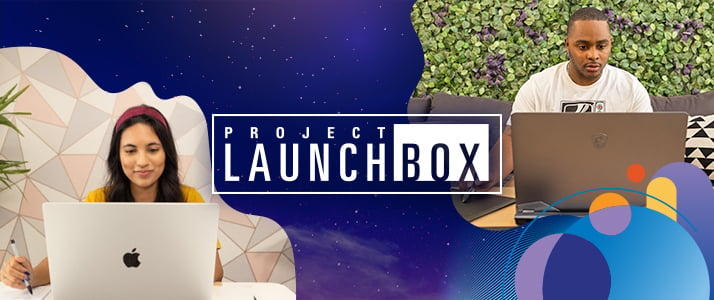Master today's technology.
Whether you've got the passion to become an innovator or you're just ready to take your skill set as a developer or designer to the next creative level, Full Sail University's web and technology degree programs can teach you the tools. You'll learn a variety of fundamentals and work on real-world projects to build the skills to start a future in the digital world.
Computer Science Bachelor's — Campus
This program introduces students to the design, development, and implementation of software-based solutions and products for business, entertainment, and consumer markets.
Courses Include:
-
Software Engineering
‐ Students will be working inside a prebuilt software solution wherein they will find and fix various kinds of software bugs, add new features to the software, and track the changes made by using version-control tools.
-
Computer Organization and Architecture
‐ Students will learn how to utilize hardware and software tools for digital system analysis and synthesis.
-
Software Integration
‐ Students will utilize various tools and methodologies to test their software applications, including static and dynamic analysis.
-
Software Engineering
-
Computer Organization and Architecture
-
Software Integration
Full Sail's Computer Science bachelor's is also offered with specialized online concentrations in Artificial Intelligence or Mobile Development.
Computer Science Master's — Online
As the world of emerging technology continues to grow, so do the opportunities. At Full Sail, we've developed a graduate degree program focused on growing tech sectors, such as AI, machine learning, and data science.
Courses Include:
-
Artificial Intelligence
‐ Learn techniques for designing and creating algorithms to create intelligent agents. The course covers topics like reasoning, knowledge representation, planning, expert systems, and cognitive sciences.
-
Machine Learning
‐ Explore software solutions that learn through provided data to create their own machine-learning solutions. This course covers topics like statistical supervised and unsupervised learning methods, Bayesian learning methods, and reinforcement learning.
-
Data Science
‐ Create solutions to break down large amounts of data into usable information. This course covers topics for processes, algorithms and tools to extract knowledge from structured and unstructured data.
-
Artificial Intelligence
-
Machine Learning
-
Data Science
Cybersecurity Bachelor's Completion Degree — Campus & Online
The Cybersecurity program prepares information security professionals with the knowledge and skills needed to protect systems and information against an evolving landscape of potential hazards. The first half of the Cybersecurity bachelor's degree program consists of an associate degree in Information Technology. The IT foundation of the program complements the second half, a completion program of in-depth cybersecurity courses.
Courses Include:
-
Cyber Crime and Incident Response
‐ This course reveals the inner workings and strategy behind hazards such as computer and network intrusion, ransomware, industrial espionage, cyber terrorism, social engineering, fraud, and emerging threats.
-
Security Compliance and Privacy
‐ This course explores the laws and compliance parameters that apply to various worldwide governing jurisdictions and independent industry bodies.
-
Threat Protection and Testing
‐ Using automated real-time threat intelligence, students will learn to protect the confidentiality, integrity, and availability of systems and data.
-
Cyber Crime and Incident Response
-
Security Compliance and Privacy
-
Threat Protection and Testing
Game Development Bachelor's — Campus & Online
In this program, students master the technology and tools necessary to develop and program single and multiplayer video games for gaming consoles, personal computers, and networks.
Courses Include:
-
Artificial Intelligence
‐ Students learn techniques for designing intelligent behaviors and creating lifelike behaviors in characters in order to provide realism, and computer opponents that continue to challenge players even after repeated gameplay.
-
Engine Development
‐ This course emphasizes debugging, development of problem solving skills, reading and understanding pre-written code, requirements analysis, and working toward being a better software engineer upon graduation.
-
Data Structure and Algorithms
‐ Students learn how fundamental data structures and algorithms function and are implemented while also learning about managing complexity, linked structures, abstraction, analysis, vectors, lists, and more.
-
Artificial Intelligence
-
Engine Development
-
Data Structure and Algorithms
Information Technology Bachelor's — Campus
This program is designed to prepare students for the information technology field with the expertise to define and develop the virtualization and interconnection of data and media.
Courses Include:
-
Data Storage Systems
‐ Students will learn the workflow and strategies used by the industry to distribute data across a network.
-
Computer Operating Systems
‐ This course explores the concepts of operating systems and how they interface with hardware and application software.
-
Database Systems
‐ This course explores topics such as replication and data distribution, security practices, performance, capacity management, essential backup, and recovery skills.
-
Data Storage Systems
-
Computer Operating Systems
-
Database Systems
Simulation & Visualization Bachelor's — Campus
This program familiarizes students with the technical and critical thinking skills needed to study, architect, develop, and test simulation and visualization systems.
Courses Include:
-
Data Visualization and Modeling
‐ This course covers techniques that allow developers to integrate large data sets from disparate sources and create visualizations of sample data.
-
Simulation and Visualization Environments
‐ This course will touch on the fundamental elements of the environmental aspect of a simulation and visualization, including the differences between various implementation approaches such as virtual reality and augmented reality.
-
Simulation and Visualization Software
‐ This course introduces students to available software applications and the art of building simulation software.
-
Data Visualization and Modeling
-
Simulation and Visualization Environments
-
Simulation and Visualization Software
User Experience Bachelor's — Online
Students in the User Experience bachelor’s program learn the theories, psychology, and research strategies behind designing engaging, human-centered experiences with interactive media, including games, websites, and more.
Courses Include:
-
User Experience Design
‐ Learn how audience, testing, and psychology affect how users interact with a product or service as well as the UX design workflows and terminology used by the pros.
-
UX/UI for Gaming Platforms
‐ Find out how user experience and user interface contributes to engaging, user-friendly player experiences on a variety of gaming platforms.
-
Psychology of Perception in UX
‐ Discover how people perceive and process information with concepts in information grouping, subjective consistency, and contrast, and how that impacts user experience.
-
User Experience Design
-
UX/UI for Gaming Platforms
-
Psychology of Perception in UX
Web Development Bachelor's — Online
This degree program focuses on the architecture, interactivity, and programming needed to integrate and deploy modern websites and web applications.
Courses Include:
-
Interfaces and Usability
‐ The Interfaces and Usability course focuses on fundamental interaction-design and usability principles coupled with proven user interface–design patterns.
-
Advanced Server-Side Languages
‐ Students will expand on the foundation concepts to further investigate topics such as routes, proxies, templates, and records management.
-
Application Integration and Security
‐ In this course dynamics such as data retention, user data privacy, data localization, and regulatory requirements will be investigated.
-
Interfaces and Usability
-
Advanced Server-Side Languages
-
Application Integration and Security

